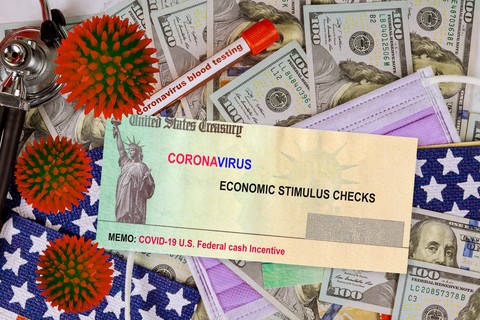Many individuals living in the United States, including many non-citizens, are eligible to receive an Economic Impact Payment, or stimulus check, authorized by the Coronavirus Aid, Relief, and Economic Security Act (“CARES Act”).
Eligible individual taxpayers should automatically receive a payment up to $1,200 and couples who file their taxes jointly will receive a payment up to $2,400.
So, who is eligible for the CARES Act payment?
The Internal Revenue Service (“IRS”) states that qualified individuals must meet the following requirements:
1. Be a U.S. citizen or U.S. resident alien;*
2. Cannot be claimed as a dependent on someone else’s tax return;
3. Have a Social Security number (SSN) that is “valid for employment;” and
4. Have an adjusted gross income below a required amount based on your tax filing status and number of qualified children.**
Appallingly, the CARES Act excludes many immigrant and mixed-immigrant status families from receiving the payment.
For purposes of this post, we want to focus on the Social Security number (“SSN”) requirement.
Individual tax filers and couples who file jointly must have been issued SSNs that are “valid for employment” by the time they file their qualifying tax return (although there is an exception for individuals with a valid SSN who served in the U.S. armed forces).
What happens if you and/or your spouse do not have an SSN and instead file taxes with an Individual Taxpayer Identification Number (“ITIN”)?
Under the CARES Act, individuals and couples filing jointly who file taxes with an ITIN are not eligible for the payment, even if they have qualifying children with SSNs.
Additionally, if just one of the individuals in a couple who files jointly does not have an SSN, the entire household is excluded from receiving the payment, including dependent children with valid SSNs. Mixed-immigration status families should therefore consult with a tax professional to determine whether it is in the best interest of the couple/family to file their taxes separately so that the eligible household members can get the CARES Act payment.
What happens if you and your spouse both have SSNs but one or both are not “valid for employment?”
According to the IRS, an individual whose Social Security card contains the language “Not Valid for Employment” is not eligible for the CARES Act payment, but individuals whose Social Security cards say “Valid for Work Only with DHS Authorization” or do not contain any additional language are eligible.
Individuals with qualifying Social Security cards must have been authorized to work at the time they filed their qualifying tax return. What remains unclear is whether noncitizens with an SSN that was “valid for employment” at the time they filed their taxes, but has since expired, are still eligible for the CARES Act payment. The IRS has not clarified this gray area.
Finally, the CARES Act payment should not be considered a means-tested benefit and should therefore not negatively affect a noncitizen’s immigration status or result in a public charge bar to residency or other nonimmigrant status in the future.
If you believe you are eligible for the CARES Act payment but have not yet received it, you can check on the status at the IRS Website here.
If you have questions about this or any other immigration matter, Kolko & Casey, P.C. remains available for your call. We wish you and those you love health and safety during these challenging times.
*A “resident alien” must reside primarily in the United States. For more information about who qualifies as a U.S. resident alien, please see the IRS website. Importantly, the IRS definition of "resident alien" is different than "lawful pemanent resident" for immigration purposes.
**For more information on eligibility requirements, please see the IRS website.
